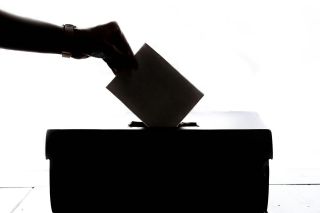Personality
Shared Beliefs: Aversive Personality and Political Views
Learn the insights from a multi-country investigation with 66,000+ participants.
Updated April 23, 2024 Reviewed by Michelle Quirk
Key points
- Recent research explored links between aversive personality and sociopolitical beliefs and preferences.
- Higher levels of aversive personality were associated with sociopolitical beliefs linked to conservatism.
- Individuals with higher levels of aversive personality also reported a more right-wing political orientation.
Many factors are associated with individuals’ (socio)political beliefs and preferences (see, e.g., here, here, or here). This includes robust evidence that certain personality traits are related to (socio)political beliefs and preferences. Here, most research has focused on the dimensions of models of basic personality structure like the Big Five/Five-Factor or the HEXACO models. A team of researchers (including me) recently conducted three studies to extend existing knowledge to aversive personality in a multi-country investigation with more than 66,000 participants from 38 countries.
%20from%20Pixabay.png.jpg?itok=UW3D0MiQ)
D Represents Aversive Personality
In the investigation, aversive personality was assessed via the "D factor of personality," the common core of all ethically and/or socially aversive traits (such as psychopathy, self-centeredness, or spitefulness). D is defined as “the general tendency to maximize one's individual utility—disregarding, accepting, or malevolently provoking disutility for others—accompanied by beliefs that serve as justifications.” In line with this definition, previous research showed that D relates to a wide range of constructs representing an individual’s tendency to increase one’s utility at the cost of others (including society at large). Examples include aggression, exploitation, crime, self-serving financial dishonesty, and vengeance (see, e.g., here or here).
D and Beliefs Used to Construct Justifications
Crucially, individuals high in D hold various beliefs from which they can derive justifications for aversive behavior. For example, individuals high in D are more likely to be cynical and to believe that the world is a competitive and dangerous place. More generally, individuals high in D hold beliefs representing distrust in other people and society at large. Based on such beliefs, they are more likely to construct a justification (such as “everyone does it” or “eat or be eaten”) for aversive behavior, which, in turn, they are more likely to engage in.
Why D Might Relate to (Socio)Political Beliefs and Preferences
Given that individuals high in D hold certain distrust- and hierarchy-related beliefs from which they justify aversive behavior, a link with political orientation and preferences is theoretically plausible: Some of the beliefs that individuals high in D hold (to justify aversive behavior) happen to form the basis of more conservative (socio)political beliefs and preferences. For instance, two prominent sociopolitical beliefs are right-wing authoritarianism (RWA) and social dominance orientation (SDO), which reflect how people think about the ordering of society.
Stated briefly, RWA represents a preference toward obedience to authorities and traditional social norms and values, and SDO represents a preference toward intergroup hierarchy and inequality—and both RWA and SDO are considered to underlie economic and sociocultural conservatism (there is a host of research on RWA and SDO; see, e.g., here, here, or here). Importantly, beliefs that are widely considered conducive to RWA and SDO assume that the world is a dangerous place and a competitive jungle. These are exactly the same beliefs individuals high in D are also more likely to hold, so that those high in D are also more likely to score higher on RWA and SDO and, by extension, are also more likely to lean more toward the conservative or right-wing pole on the (simplified) left-right political spectrum.

D and (Socio)Political Beliefs and Preferences Across Countries
We investigated associations between D and both RWA and SDO across countries (relying on data from more than 26,000 individuals from 30 countries including, e.g., Belgium, China, Germany, Malaysia, Mexico, Singapore, United Kingdom). While the strengths of the associations between D and each RWA and SDO differed between countries, results showed that individuals with higher levels of D reported higher levels of both RWA and SDO in each country considered. Overall, effects were larger for SDO (and, thus, a preference for intergroup hierarchy and inequality) as compared to RWA.
In addition, associations between D and individuals’ self-placement on a political orientation scale ranging from “left” to “right” were investigated (note that there are some limitations with using such a single measure to assess political orientation; e.g., here, here, or here). Here, data included more than 37,000 individuals from 31 countries (e.g., Argentina, Australia, Canada, Italy, Japan, Lithuania, Sweden, United States). Again, results showed that the strengths of the association between D and a left-right political orientation differed between countries, but in every country considered, those with higher (as compared to lower) levels of D tended to place themselves more to the right on the scale.
Notably, in both multi-country studies, results remained stable when controlling for other individual variables (e.g., age) and country-level variables (e.g., the “WEIRDNESS” of the country; that is, the extent to which a country is Western, educated, industrialized, rich, and democratic). There was also no strong support for a curvilinear relationship and, thus, no evidence for the idea that high-D individuals might hold more extreme (socio)political beliefs and preferences in general (e.g., extreme positions at both the left and right ends of the political orientation scale).

Final Study and Conclusion
In line with the theoretical considerations, we do not interpret the results as support for a direct link between aversive personality and more conservative, right-wing preferences—especially because the associations, although robust, were only small or medium-sized at most. Instead, we maintain and show that aversive personality and political preferences share a common set of belief systems and worldviews.
Crucially, in aversive personality as compared to political orientation, these beliefs serve different "functions": For those high in D, beliefs are used to justify utility maximization at others’ costs; with regard to one’s political orientations, such beliefs form the basis of how one thinks about the desired ordering of society (given what one believes to be the nature of the world). Thus, there is an indirect link between D and more conservative political preferences, which was also supported by further findings: In the final study (using data from a German sample), we measured perceiving the world as competitive and as dangerous, RWA, SDO, self-placement on the left-right political orientation scale, and self-reported voting behavior shortly after a national election. Results showed that individuals with higher (as compared to lower) levels of D self-reported more competitive and dangerous world beliefs, higher levels of RWA and SDO, a political orientation comparatively more to the right on the scale, and corresponding voting behavior.
Moreover, results held once controlling for basic personality (in terms of the HEXACO) dimensions, and we illustrated how aversive personality might be expressed in political orientation and voting through worldviews and the sociopolitical beliefs RWA and SDO. Overall, findings across all studies support the theoretical idea that individuals’ beliefs about how society ought to be structured (RWA and SDO) and their basis in terms of worldviews (a dangerous and competitive place) are shared among those high in D and those with more conservative political preferences.
References
Moshagen, M., Hilbig, B. E., & Zettler, I. (in press). How and why aversive personality is expressed in political preferences. Journal of Personality and Social Psychology. https://doi.org/10.1037/pspp0000498




